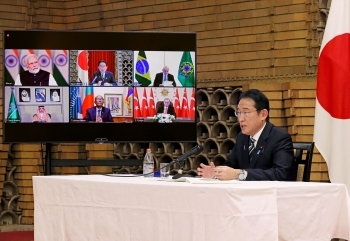G20 (Summit on Financial Markets and the World Economy)
G20 Leaders’ Video Conference (Summary)
 Prime Minister Kishida speaking
Prime Minister Kishida speaking at the G20 Leaders' Video Conference (Photo: Cabinet Public Affairs Office)
On November 22, commencing at 9:00 p.m. JST for approximately 3 hours and 30 minutes, the G20 Leaders’ Video Conference was hosted by India, the G20 Presidency. Mr. KISHIDA Fumio, Prime Minister of Japan, attended it. The overview of the meeting is as follows.
At the meeting, important issues such as multilateral reforms, climate change, digital, and women-led development were discussed. G20 members affirmed that it would continue to be important for the G20 to cooperate in addressing the challenges the international community faces.
1. Overview
- Prime Minister Kishida expressed his respect for the leadership of Indian Prime Minister Modi in leading the New Delhi Summit and hosting this conference. He also welcomed the African Union (AU) as a permanent member of the G20.
- Prime Minister Kishida stated that the international community is currently facing crises of increasing complexity and that, among them, Russia's aggression against Ukraine continues despite the condemnations by other countries and has shaken the foundation of sustainable development of the world.
- Prime Minister Kishida emphasized that, under such circumstances, in addressing various challenges the international community faces, we should aim for a world caring for “human dignity," and that Japan has been addressing these challenges in cooperation with various partners based on the concept of human security.
2. Reforms of Multilateral Systems
- Prime Minister Kishida pointed out that it is necessary to reform multilateral systems in order to address more effectively to various challenges of the international community. He stated that it would be important to strengthen functions of the United Nations, including the reform of the Security Council, and that he hoped to work closely with other countries to take concrete actions.
- Regarding multilateral development banks (MDBs), Prime Minister Kishida stated that bold enhancement of their functions is necessary in order to support developing countries facing global issues. He further stated that, through the innovative guarantee mechanism recently announced by the World Bank Group, Japan will contribute to boosting the lending capacity by a few billion dollars.
- Prime Minister Kishida stated that all creditor and debtor countries should share the importance of transparent and fair development finance that complies with international rules and standards. He also pointed out the essentiality of prompt debt restructuring and improvement of debt transparency in developing countries, including middle-income countries.
3. Climate Change
- Prime Minister Kishida stated that climate change remains an urgent challenge for the G20 to tackle, and that in order to limit temperature rise to 1.5°C, we must further advance the agreement reached in New Delhi and raise our ambition toward the COP28. He called for commitments by all Parties to achieving net zero by 2050, peaking out global greenhouse gas emissions by 2025, and setting absolute emission reduction targets for all greenhouse gases.
- Prime Minister Kishida stated that it is important for all Parties and stakeholders, who have the capabilities, to contribute to finance mobilization in order to support vulnerable countries.
- Prime Minister Kishida stated that, as confirmed in New Delhi, we should aim to achieve the common goal of net zero through various pathways in line with each country’s national circumstances. He also introduced that Japan supports the efforts by the Organization for Economic Co-operation and Development (OECD) and the Asian Development Bank (ADB), and will hold the first summit meeting of the Asian Zero Emissions Community (AZEC) in Tokyo in December to promote innovation by utilizing all technologies and energy sources together with partner countries.
4. Digital
- Prime Minister Kishida stated that, with regard to AI, it is important to establish international governance that addresses risks appropriately and promotes the benefits of AI.
- Prime Minister Kishida introduced that Japan is working on establishing international governance of advanced AI through the Hiroshima AI Process, which was launched at the G7 Hiroshima Summit. He also stated that Japan would like to cooperate with countries and regions beyond the G7 from here on, and would like to cooperate with G20 members, based on the G20 AI Principles, to promote safe, secure, and trustworthy AI, so that the entire international community can enjoy the benefits.
5. Women-Led Development
- Prime Minister Kishida stated that, as confirmed at the New Delhi Summit, it is necessary to close gender gap and promote women's participation in all areas and levels of society and economy.
- Prime Minister Kishida introduced that Japan is strengthening the promotion of Women, Peace, and Security (WPS) and attaches importance to ensuring full and equal participation of women, including in the field of disaster risk reduction. He stated that Japan hopes to continue to work together with other countries.
6. Conclusion
Prime Minister Kishida stated that under the Brazil’s Presidency starting next month, Japan, shedding a light on "human dignity," will continue its contribution so that the G20 will be able to cooperate in addressing various challenges.
(Reference)Participating countries and international organizations to the G20 Leaders’ Video Conference
- G20 members
Japan, India (Presidency), Argentina, Australia, Brazil, Canada, China, France, Germany, Indonesia, Italy, Mexico, Republic of Korea, Russia, Saudi Arabia, South Africa, Turkey, United Kindom, United States, European Union, Comoros (African Union (AU) Chair) - Invited countries
Bangladesh, Egypt, Mauritius, Netherlands, Nigeria, Oman, Singapore, Spain, United Arab Emirates - International organizations
Asian Development Bank (ADB), Coalition for Disaster Resilient Infrastructure (CDRI), Financial Stability Board (FSB), International Labor Organization (ILO), International Monetary Fund (IMF), International Solar Alliance (ISA), Organization for Economic Co-operation and Development (OECD), United Nations (UN), World Bank, World Health Organization (WHO), World Trade Organization (WTO)

